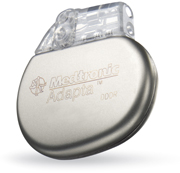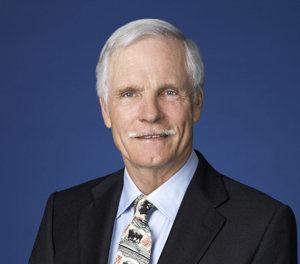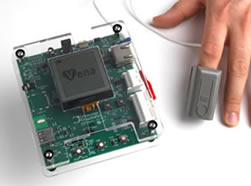 Must-read article on implantable, connected heart failure devices: The New York Times has a must-read article on connected, implantable devices for heart failure. Among the many highlights: "The devices can cost as much as $30,000. Do patients with defibrillators make up for some of that expense with fewer hospitalizations or doctor visits? A study using a similar device, made by Medtronic, suggests that is the case. The Medtronic study, directed by Dr. George Crossley, president of St Thomas Heart at Baptist Hospital in Nashville, involved 2,000 patients randomly assigned to receive a defibrillator that transmitted data or a device that did not transmit. Those with the nontransmitting device were seen in their doctor’s offices every few months, the standard of care. Patients whose devices transmitted spent less time, on average, in the hospital when they were admitted — 3.3 days compared with 4 days — and their hospital costs were $1,600 less per admission. "The plausible reason, we think, is that we got to these people much sooner in the course of their illness,' Dr. Crossley said. 'We think we did not let the people in the remote sensing group get into heart failure.'" More
Must-read article on implantable, connected heart failure devices: The New York Times has a must-read article on connected, implantable devices for heart failure. Among the many highlights: "The devices can cost as much as $30,000. Do patients with defibrillators make up for some of that expense with fewer hospitalizations or doctor visits? A study using a similar device, made by Medtronic, suggests that is the case. The Medtronic study, directed by Dr. George Crossley, president of St Thomas Heart at Baptist Hospital in Nashville, involved 2,000 patients randomly assigned to receive a defibrillator that transmitted data or a device that did not transmit. Those with the nontransmitting device were seen in their doctor’s offices every few months, the standard of care. Patients whose devices transmitted spent less time, on average, in the hospital when they were admitted — 3.3 days compared with 4 days — and their hospital costs were $1,600 less per admission. "The plausible reason, we think, is that we got to these people much sooner in the course of their illness,' Dr. Crossley said. 'We think we did not let the people in the remote sensing group get into heart failure.'" More
 Ted Turner sees the mHealth opportunity: UN Secretary-General Ban Ki-moon named the founder and chairman of the United Nations Foundation, billionaire Ted Turner, an Advocate for the Millennium Development Goals (MDGs). Turner is also keynoting the mHealth Summit coming up at the end of the year in Washington D.C. so it's not surprising he mention mHealth in his remarks about the MDGs: “We need a long-term plan for humanity and the UN’s Millennium Development Goals offer us an urgent to-do list to address the world’s toughest challenges.... The increasing usage of technology and mobile devices is creating new pathways for information-sharing and enhancing the delivery of health care and surveillance... This progress is encouraging but our work is far from over." More
Ted Turner sees the mHealth opportunity: UN Secretary-General Ban Ki-moon named the founder and chairman of the United Nations Foundation, billionaire Ted Turner, an Advocate for the Millennium Development Goals (MDGs). Turner is also keynoting the mHealth Summit coming up at the end of the year in Washington D.C. so it's not surprising he mention mHealth in his remarks about the MDGs: “We need a long-term plan for humanity and the UN’s Millennium Development Goals offer us an urgent to-do list to address the world’s toughest challenges.... The increasing usage of technology and mobile devices is creating new pathways for information-sharing and enhancing the delivery of health care and surveillance... This progress is encouraging but our work is far from over." More
 Qualcomm teams up with Cambridge Consultants: Two Continua Health Alliance companies have teamed up to create a new, low-cost platform that combines Qualcomm's Wearable Mobile Device cellular module and Cambridge Consultants' Vena software stack. The platform enables the collection of data from Continua certified devices over the Continua Personal Area Network (PAN) interface, and transmits this data over the Continua Wide Area Network (WAN) interface to on-line health services. Vena includes the Bluetooth™ Health Device Profile (HDP) optimized for the secure transport of medical data between health devices at short ranges, while the Qualcomm Wearable Mobile Device supports a variety of 3G networks and provides integrated GPS, an accelerometer and Bluetooth technologies. More
Qualcomm teams up with Cambridge Consultants: Two Continua Health Alliance companies have teamed up to create a new, low-cost platform that combines Qualcomm's Wearable Mobile Device cellular module and Cambridge Consultants' Vena software stack. The platform enables the collection of data from Continua certified devices over the Continua Personal Area Network (PAN) interface, and transmits this data over the Continua Wide Area Network (WAN) interface to on-line health services. Vena includes the Bluetooth™ Health Device Profile (HDP) optimized for the secure transport of medical data between health devices at short ranges, while the Qualcomm Wearable Mobile Device supports a variety of 3G networks and provides integrated GPS, an accelerometer and Bluetooth technologies. More
Non-contact sensors: Set to revolutionize remote heart monitoring? More




















